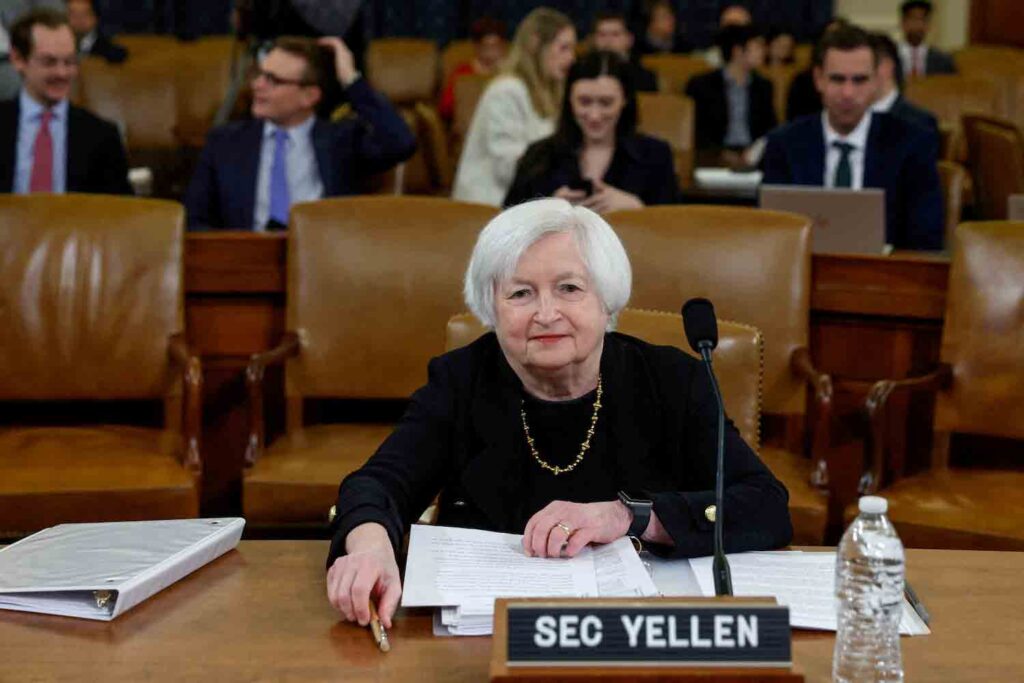US banking system sound, but not all deposits guaranteed – Treasury

U.S. Treasury Secretary Janet Yellen attends a U.S. House Ways and Means Committee hearing on President Joe Biden’s fiscal year 2024 Budget Request on Capitol Hill in Washington, U.S., March 10, 2023. REUTERS/Evelyn Hockstein/File Photo
WASHINGTON -The U.S. banking system remains sound and Americans can feel confident that their deposits will be there when needed, Treasury Secretary Janet Yellen said on Thursday, although she denied that recent emergency actions following two large bank failures means that a blanket government guarantee now existed for all deposits.
In her first public remarks since the weekend’s emergency measures with other regulators to ensure no depositors at Silicon Valley Bank and Signature Bank suffered losses, Yellen was pressed if that meant all uninsured deposits were now guaranteed.
“A bank only gets that treatment,” she told Republican Senator James Lankford, if supermajorities of the boards of the Federal Reserve, the Federal Deposit Insurance Corp and “I, in consultation with the president, determine that the failure to protect uninsured depositors would create systemic risk and significant economic and financial consequences.”
Her comment was the first explicit indication of regulators’ views about the limits of the weekend’s extraordinary guarantee that ensured that tens of billions in uninsured deposits at Silicon Valley and Signature were not lost.
Ahead of that exchange, Yellen had touted the “decisive and forceful” emergency measures taken on Sunday, saying they had helped restore depositors’ confidence and prevented a more wide-ranging run on banks.
“I can reassure the members of the committee that our banking system is sound, and that Americans can feel confident that their deposits will be there when they need them,” Yellen said in the remarks.
“This week’s actions demonstrate our resolute commitment to ensure that depositors’ savings remain safe.”
But it was clear that the $250,000 per depositor limit on FDIC insurance remained in place and that any future failure would need to pose risks similar to those seen at Silicon Valley and Signature.
In their cases, she said, “the chances of contagion that other banks might be regarded as unsound and suffer runs, seemed extremely high, and the consequences would be very serious.”
More than $9.2 trillion of U.S. bank deposits were uninsured at the end of last year, accounting for more than 40% of all deposits, according to Federal Reserve data. Those uninsured deposits are not distributed evenly across the country, FDIC data shows.
‘WEREN’T ON TOP OF IT’
The hearing, previously scheduled to discuss the Biden administration’s budget proposal, offered the first public accounting by a member of the band of bank overseers who organized the rescue following Silicon Valley’s failure last Friday. Signature was seized by regulators over the weekend.
The emergency measures stretched beyond the depositor backstop, including enhancements for banking sector liquidity anchored by the Fed. The actions have been greeted with both relief and astonishment on Capitol Hill, where Democrats control the Senate and Republicans hold the House of Representatives.
Several lawmakers bemoaned the failure of regulators to cotton onto the vulnerabilities before the banks collapsed in sudden fashion.
“This administration has a great deal of responsibility for the bank failures that we had,” Republican Senator Charles Grassley told reporters outside the hearing, adding regulators “weren’t on top of it” in California.
Yellen said Silicon Valley’s collapse was essentially an inability to meet depositor demands for their money after interest rate hikes by the Federal Reserve over the last year undercut the value of the bond investments relied upon to fund the customer withdrawals. She also noted the high level of uninsured deposits at Silicon Valley as an aggravating factor.
“There was a liquidity risk in this situation,” Yellen told the committee. “There will be a careful look at what happened in the bank and what initiated this problem, but clearly, the downfall of the bank, the reason it had to be closed, was that it couldn’t meet depositors’ withdrawal requests.”
She made no reference in the prepared remarks to the situation surrounding Credit Suisse, which saw its shares plunge on Wednesday before regulators pledged a liquidity lifeline to the flagship Swiss lender.
“We’re very focused right now on stabilizing the banking system and shoring up confidence, and I think there will be plenty of time that will be appropriate to look at what happened, and consider whether or not regulatory or supervisory changes are necessary,” she said.
“But for now, I would like to see confidence restored in the soundness of American banks.”

